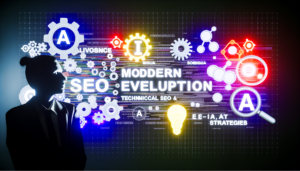The Role of Artificial Intelligence in Modern SEO Strategies
Search Engine Optimization (SEO) has undergone a seismic shift in recent years, driven largely by advancements in artificial intelligence (AI). Once reliant on manual keyword stuffing and backlink schemes, SEO now demands a sophisticated understanding of user intent, content relevance, and algorithmic adaptability. AI has emerged as a game-changer, enabling marketers to analyze vast datasets, predict trends, and optimize content with unprecedented precision. This article explores how AI is reshaping SEO, from automating repetitive tasks to enhancing personalization and redefining competitive strategies. By understanding these innovations, businesses can stay ahead in an increasingly dynamic digital landscape.
AI-Powered Data Analysis and Keyword Research
Traditional keyword research tools pale in comparison to AI-driven platforms that process search patterns, semantic relationships, and user behavior in real time. Machine learning algorithms, such as Google’s BERT, decode context and intent behind queries, allowing marketers to target long-tail keywords and latent semantic indexing (LSI) terms more effectively. Tools like Ahrefs and SEMrush now integrate AI to predict keyword volatility and identify gaps in competitors’ strategies. By leveraging natural language processing (NLP), businesses can align content with evolving search algorithms, ensuring higher visibility and relevance.
Content Generation and Optimization at Scale
AI tools like GPT-4 and Jasper are revolutionizing content creation by generating drafts, meta descriptions, and even full articles tailored to specific audiences. Beyond automation, AI enhances content quality by analyzing top-performing pages and suggesting structural improvements, readability adjustments, and sentiment alignment. For instance, SurferSEO uses AI to compare content against top-ranked pages, offering actionable recommendations for on-page SEO. However, human oversight remains critical to maintain authenticity and avoid algorithmic penalties for “thin” or repetitive content.
Personalization and User Experience Enhancement
Search engines increasingly prioritize user experience (UX), and AI plays a pivotal role in personalizing interactions. Dynamic rendering, chatbots, and recommendation engines use AI to adapt content based on user demographics, browsing history, and real-time behavior. For example, Netflix and Amazon deploy AI to customize suggestions, a strategy now being adopted by content-heavy websites. Enhanced UX metrics—such as reduced bounce rates and increased dwell time—signal quality to search engines, indirectly boosting rankings.
Predictive Analytics for Future-Proofing SEO Strategies
AI’s predictive capabilities allow marketers to anticipate algorithm updates, seasonal trends, and market shifts. Platforms like MarketMuse employ machine learning to forecast content gaps and prioritize high-opportunity topics. Similarly, AI-driven analytics tools track SERP feature trends (e.g., featured snippets, video carousels) and adjust strategies proactively. By simulating scenarios and analyzing historical data, businesses can allocate resources efficiently and mitigate risks associated with volatile search rankings.
Conclusion
Artificial intelligence has irrevocably transformed SEO, shifting the focus from rigid tactics to dynamic, data-driven strategies. By automating keyword research, optimizing content at scale, personalizing user experiences, and leveraging predictive analytics, AI empowers businesses to navigate the complexities of modern search algorithms. However, success hinges on balancing automation with human creativity—AI provides the tools, but strategic insight and ethical considerations must guide their application. As search engines evolve, adopting AI-driven SEO practices will no longer be optional but essential for maintaining visibility and relevance in an increasingly competitive digital ecosystem.


